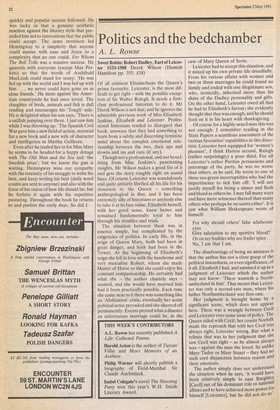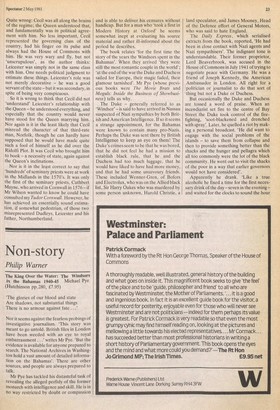Politics and the bedchamber
A. L. Rowse
Sweet Robin: Robert Dudley, Earl of Leicester 1533-1588 Derek Wilson (Hamish Hamilton pp. 355, £18) Of all eminent Elizabethans the Queen's prime favourite, Leicester, is the most difficult to get right — with the possible exception of Sir Walter Ralegh. Itneeds a firstclass professional historian, to do it. Mr Derek Wilson is not that, and he ignores the admirable previous work of Miss Elizabeth Jenkins, Elizabeth and Leicester. Professional historians tended to disregard that book, unaware that they had something to learn from a subtle and discerning feminine mind about the complex emotional relationship between the two, their ups and downs and ins and outs (if any).
Though not a professional, and not benefitting from Miss Jenkins's penetrating insights, Mr Wilson makes a good fist of it and gets the story roughly right on sound lines. Of course Leicester was scandalously and quite unfairly libelled all his life for his closeness to the Queen — something anthropological in that, and it has been extremely silly of historians or anybody else to take it at its face value. Elizabeth herself, with her good sense, knew better and remained fundamentally loyal to him through his troubles and trials.
The situation between them was in essence simple, but complicated by the exigencies of politics. In early life, in the reign of Queen Mary, both had been in great danger, and both had been in the Tower. At the beginning of Elizabeth's reign she fell in love with the handsome and very masculine Robert, whom she made Master of Horse so that she could enjoy his constant companionship. He certainly had what she — the author chastely says — wanted, and she would have married him had it been practically possible. Each time she came near to it there was something like an 'Abdication' crisis; eventually her acute political sense prevailed and she sheered off permanently. Events proved what a disaster an unfortunate marriage could be, in the case of Mary Queen of Scots.
Leicester had to accept this situation, and it mixed up his own private life dreadfully. From his various affairs with women and two or three marriages he could found no family and ended with one illegitimate son, who, ironically, inherited more than his share of the Dudley personality and gifts. On the other hand, Leicester owed all that he had to Elizabeth's favour; she evidently thought that that was enough, and he should feed on it in his heart with thanksgiving.
Of course for a highly-sexed man this was not enough. I remember reading in the State Papers a scurrilous assessment of the various favourites' capabilities in this direction: Leicester best equipped for `women's pleasure', I think Hatton second, Ralegh (rather surprisingly) a poor third. For all Leicester's rather Puritan persuasions and patronage of the party, he was no worse than others, as he said. He wrote to one of these sea-green incorruptibles who had the impertinence to tick him off: 'I will not justify myself for being a sinner and flesh and blood as others be. I may fall many ways and have more witnesses thereof than many others who perhaps be no saints either'. It is just what William Shakespeare wrote of himself: For why should others' false adulterate eyes Give salutation to my sportive blood? Or on my frailties why are frailer spies . . No, I am that I am.
• The disadvantage of being an amateur is that the author has not a clear grasp of the political inwardness, or even significance, of it all. Elizabeth I had, and summed it up in a judgment of Leicester which the author may not know: 'There wanteth a Northumberland in him'. That meant that Leicester was only a second-rate man, where his father Northumberland was first-rate.
Her judgment is brought home by a significant scene, which does not appear here. There was a wrangle between Cecil and Leicester over some issue of policy. The Queen sided with Cecil; her cousin Norfolk made the reproach that with her Cecil was always right, Leicester wrong. But what a tribute that was to her judgment that she saw Cecil was right — as he almost always was — against the man she loved. So unlike Mary Tudor or Mary Stuart — they had no such cool disjunction between reason and their emotions. The author simply does not understand the situation when he says, 'it would have been relatively simple to ease BurghleY [Cecil] out of his dominant role in national affairs and to have achieved more power for himself [Leicester], but he did not do 50 Quite wrong: Cecil was all along the brains of the regime; the Queen understood that, and fundamentally was in political agreement with him. No less important, Cecil represented the governing class of the country, had his finger on its pulse and always had the House of Commons with him. He was very wary and fly, but not 'unscrupulous', as the author thinks: Leicester was simply not in the same class with him. One needs political judgment to estimate these things. Leicester's role was not merely decorative — he was a good servant of the state —but it was secondary, in spite of being very conspicuous.
So it is wrong to think that Cecil did not 'understand' Leicester's relationship with the Queen — he understood everything, and especially that the country would never have stood for the Queen marrying him. Nor again is it in the least likely that Cecil misread the character of that third-rate man, Norfolk, though he can hardly have supposed that he would have made quite such a fool of himself as he did over the Ridolfi Plot. It was Cecil who brought him to book — a necessity of state, again against the Queen's inclinations.
Nor is it in the least correct to say that 'hundreds' of seminary priests were at work in the Midlands in the 1570's. It was only the first of the seminary priests, Cuthbert Mayne, who arrived in Cornwall in 1576— if Mr Wilson wanted to know he could have consulted my Tudor Cornwall. However, he has achieved an essentially sound estimation, if somewhat pedestrian, of those two misrepresented Dudleys, Leicester and his father, Northumberland. . and is able to deliver his censures without handicap. But for a man who 'took a first in Modern History at Oxford' he seems somewhat inept at evaluating his source material and rather ill-informed about the period he describes.
The book relates 'for the first time the story of the years the Windsors spent in the Bahamas'. When they arrived 'they were still the most romantic couple in the world'; 'at the end of the war the Duke and Duchess sailed for Europe, their magic faded, their glamour tarnished'. Mr Pye (whose previous books were The Movie Brats and Moguls: Inside the Business of Showbusiness) tells us why.
The Duke — generally referred to as 'Windsor' — is said to have arrived in Nassau suspected of Nazi sympathies by both British and American Intelligence. If so it seems a strange appointment, for the Bahamas were known to contain many pro-Nazis. Perhaps the Duke was sent there by British Intelligence to keep an eye on them! The Duke's crimes seem to be that he was bored, that he did not feel he had a mission to establish black rule, that he and the Duchess had too much luggage, that he would have liked to have had more money, and that he had some unsavoury friends. These included Wenner-Gren, of Bofors and Electrolux, who was on the Allied black list, Sir Harry Oakes who was murdered by some person unknown, Harold Christie, a land speculator, and James Mooney, Head of the Defence effort of General Motors, who was said to hate England.
The Daily Express, which serialised extracts from the book, reported, 'He had been in close contact with Nazi agents and Nazi sympathisers'. The indignant tone is understandable. Their former proprietor, Lord Beaverbrook, was accused in the House of Commons in July 1941 of trying to negotiate peace with Germany. He was a friend of Joseph Kennedy, the American Ambassador in London. All right for a !politician or journalist to do that sort of thing but not a Duke or Duchess.
But occasionally the Duke and Duchess are tossed a word of praise. When an incendiarist set fire to the centre of Bay Street the Duke took control of the firefighting, 'soot-blackened and drenched with spray'. Later, he quelled a riot by making a personal broadcast. 'He did want to engage with the social problems of the islands — to save them from collapse and then to provide something better than the shacks and the hunger and pellagra which all too commonly were the lot of the black community. He went out to visit the shacks of the poor in a way that earlier governors would not have considered'.
Apparently he drank, 'Like a true alcoholic he fixed a time for the first necessary drink of the day —seven in the evening — and waited for the clocks to sound the hour with terrible impatience'. This definition of alcoholism will undoubtedly give comfort to Britain's lunch-time drinkers.
'His politics were of his class and time -instinctual, usually conservative, often with a strain of unconsidered racism . . . When he was still a child he had waited for his parents to return from some great imperial progress and he always remembered, with horror, his growing fear that they would return scorched black by the sun'. (The source of this gem is not mentioned.) 'He had one other enthusiasm which is awkward in a prince. He loved women.
Women are a fine avocation for a prince but love can present problems. Wallis Simpson was the nemesis of David Windsor. She was a woman with a past, like any woman who had not perfected her life to meet the exacting standards of the British court'. But, 'she showed no signs of wanting to be queen. To the very moment of the abdication, she was ready to renounce marriage and her prince.
All the confusion and the passion came from the silly uxorious instincts of the Prince of Wales once he had become King.
She saw problems that other white ladies preferred not to consider. She worked with black children in her infant welfare clinics.
She broke an important white taboo – having physical contact with black children to measure and weigh and tend them. She also knew the syphilis rate, which was unspeakable to the whites'.
Although Mr Pye finds the Windsors 'naive about their contacts', he remarks of the Duke 'there was no possibility at all he could help the Germans as an undercover man. The idea is absurd. And since it is absurd it makes unlikely any stories of actual contacts with the Nazis'.
Perhaps it is a sufficient comment on the authoritative value of this book that it is not provided with an index.




















































































 Previous page
Previous page